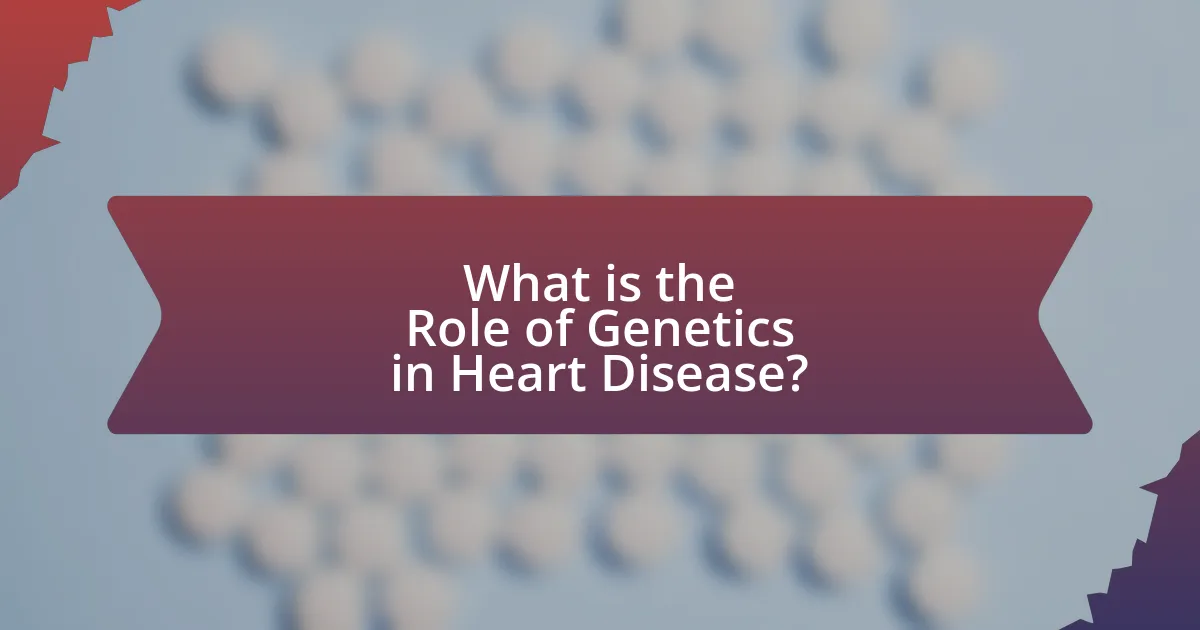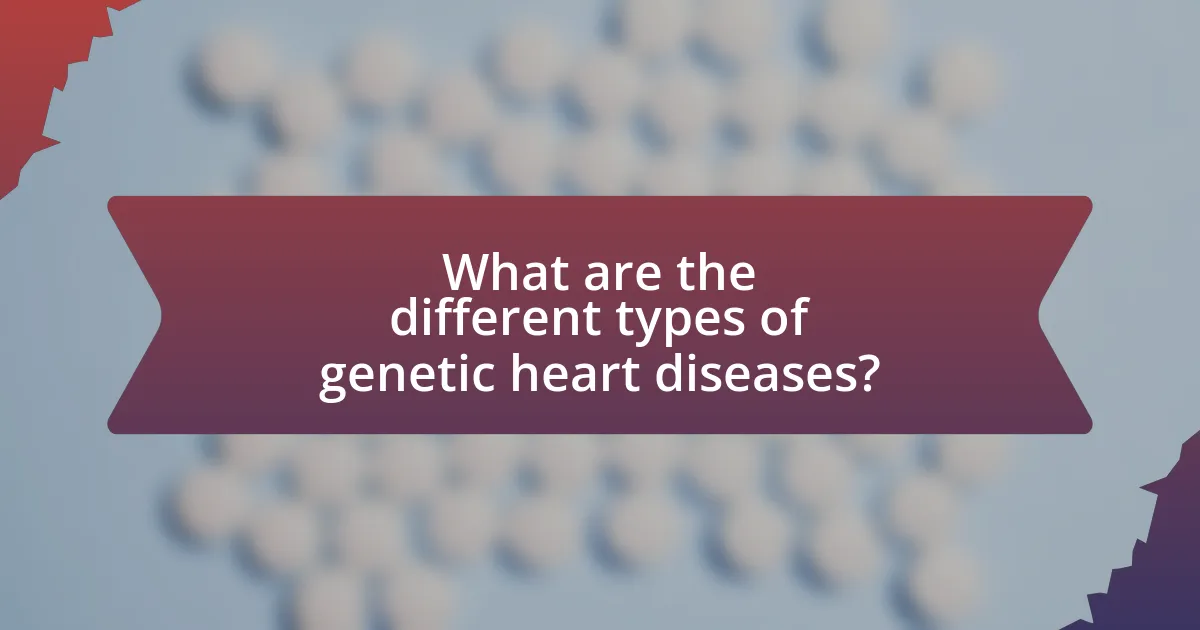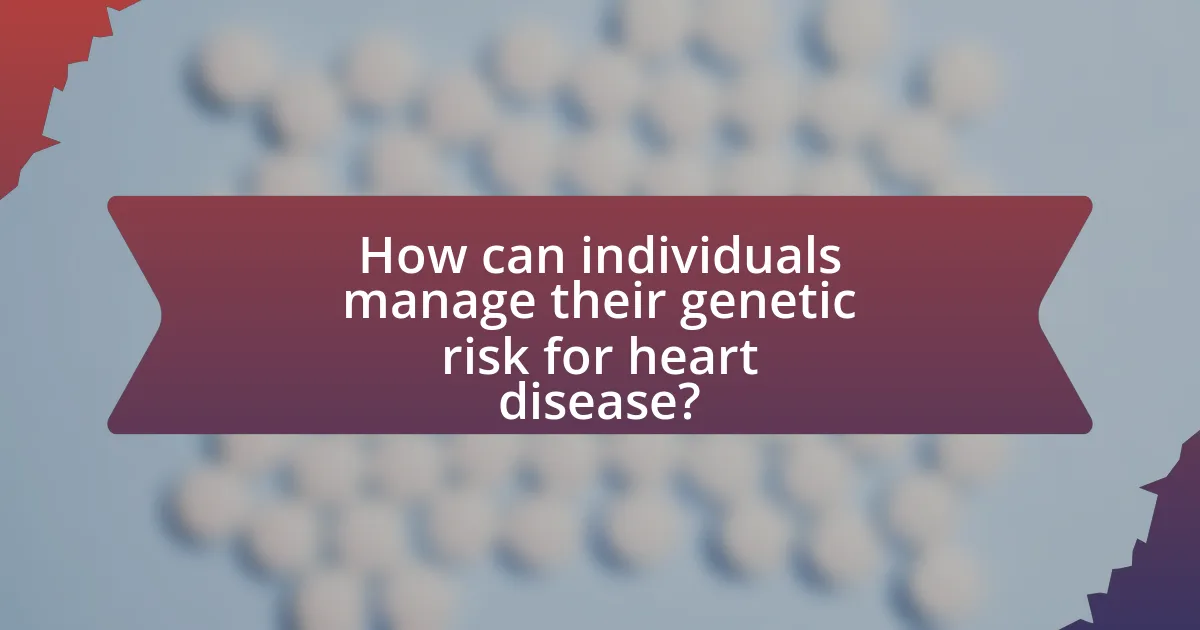The article focuses on the significant role of genetics in heart disease, highlighting how specific genetic mutations and variations influence an individual’s susceptibility to various cardiovascular conditions. It discusses the impact of genes such as LDLR, APOB, and MYH7 on heart health, detailing how mutations can lead to diseases like familial hypercholesterolemia and hypertrophic cardiomyopathy. The article emphasizes the importance of understanding genetic predispositions for effective heart disease prevention and management, including the role of lifestyle changes and genetic testing in mitigating risks. Additionally, it explores the implications of genetic heart diseases on treatment approaches and the advancements in personalized medicine and gene therapy.

What is the Role of Genetics in Heart Disease?
Genetics plays a significant role in heart disease by influencing an individual’s susceptibility to various cardiovascular conditions. Specific genetic mutations and variations can affect lipid metabolism, blood pressure regulation, and the structural integrity of the heart, leading to conditions such as coronary artery disease, cardiomyopathy, and arrhythmias. For instance, mutations in genes like LDLR and APOB are linked to familial hypercholesterolemia, which increases the risk of early heart disease. Additionally, studies indicate that approximately 40-60% of the risk for coronary artery disease can be attributed to genetic factors, highlighting the importance of genetics in understanding and managing heart disease.
How do genetic factors contribute to heart disease risk?
Genetic factors significantly contribute to heart disease risk by influencing traits such as cholesterol levels, blood pressure, and the propensity for atherosclerosis. Specific gene variants, such as those in the LDL receptor gene, can lead to familial hypercholesterolemia, resulting in elevated LDL cholesterol levels and increased heart disease risk. Studies indicate that individuals with a family history of heart disease have a higher likelihood of developing similar conditions, with heritability estimates for coronary artery disease ranging from 40% to 60%. Additionally, genetic predispositions can interact with environmental factors, further amplifying the risk of heart disease.
What specific genes are associated with heart disease?
Specific genes associated with heart disease include the LDLR, APOB, PCSK9, and MYH7 genes. The LDLR gene is crucial for regulating cholesterol levels, and mutations can lead to familial hypercholesterolemia, increasing heart disease risk. The APOB gene encodes a protein essential for lipid metabolism, and variations can affect cholesterol transport. The PCSK9 gene influences cholesterol levels by regulating LDL receptors, with certain mutations linked to increased heart disease risk. Lastly, the MYH7 gene, which encodes a cardiac muscle protein, is associated with hypertrophic cardiomyopathy, a condition that can lead to heart failure. These associations are supported by genetic studies that demonstrate the impact of these genes on cardiovascular health.
How do mutations in these genes affect heart health?
Mutations in genes associated with heart health can lead to various cardiovascular diseases, including cardiomyopathy, arrhythmias, and congenital heart defects. For instance, mutations in the MYH7 gene, which encodes a cardiac muscle protein, are linked to hypertrophic cardiomyopathy, a condition characterized by abnormal thickening of the heart muscle that can obstruct blood flow and lead to heart failure. Additionally, mutations in the SCN5A gene, responsible for encoding sodium channels in heart cells, can cause long QT syndrome, increasing the risk of life-threatening arrhythmias. These genetic alterations disrupt normal cardiac function, highlighting the critical role of genetics in heart disease.
Why is understanding genetics important for heart disease prevention?
Understanding genetics is crucial for heart disease prevention because it allows for the identification of individuals at higher risk due to hereditary factors. Genetic predispositions can influence cholesterol levels, blood pressure, and other cardiovascular risk factors, enabling targeted interventions. For instance, studies have shown that individuals with specific genetic markers, such as those associated with familial hypercholesterolemia, have a significantly increased risk of heart disease, necessitating early screening and lifestyle modifications. By understanding these genetic links, healthcare providers can implement personalized prevention strategies, ultimately reducing the incidence of heart disease.
How can genetic testing inform lifestyle choices?
Genetic testing can inform lifestyle choices by identifying an individual’s predisposition to certain health conditions, including heart disease. For instance, genetic variants such as those in the APOE gene can indicate a higher risk for cardiovascular issues, prompting individuals to adopt heart-healthy behaviors like improved diet and increased physical activity. Studies have shown that individuals aware of their genetic risks are more likely to engage in preventive measures; for example, a study published in the Journal of the American Medical Association found that participants who received genetic risk information made significant changes to their diet and exercise habits. This evidence supports the notion that genetic insights can lead to informed lifestyle modifications aimed at reducing health risks.
What role does family history play in assessing risk?
Family history plays a critical role in assessing the risk of heart disease, as it can indicate a genetic predisposition to cardiovascular conditions. Studies show that individuals with a family history of heart disease are at a significantly higher risk; for instance, having a first-degree relative with heart disease doubles the risk of developing similar conditions. This correlation is attributed to shared genetic factors, lifestyle habits, and environmental influences within families, making family history a vital component in risk assessment protocols for heart disease.

What are the different types of genetic heart diseases?
Genetic heart diseases can be categorized into several types, including cardiomyopathies, congenital heart defects, arrhythmias, and aortopathies. Cardiomyopathies, such as hypertrophic cardiomyopathy and dilated cardiomyopathy, are characterized by changes in the heart muscle that affect its size and function. Congenital heart defects are structural problems with the heart present at birth, which can be caused by genetic mutations. Arrhythmias, such as long QT syndrome, involve irregular heartbeats due to genetic factors affecting the heart’s electrical system. Aortopathies, including Marfan syndrome, involve abnormalities in the aorta and are often linked to genetic mutations. These classifications are supported by genetic research indicating that mutations in specific genes can lead to these conditions, highlighting the significant role of genetics in heart disease.
How do inherited conditions differ from acquired heart diseases?
Inherited conditions are genetic disorders passed down from parents to offspring, while acquired heart diseases develop due to lifestyle factors, environmental influences, or other health conditions. Inherited heart diseases, such as hypertrophic cardiomyopathy, are caused by mutations in specific genes and can manifest at any age, often without prior risk factors. In contrast, acquired heart diseases, like coronary artery disease, typically arise from factors such as poor diet, lack of exercise, smoking, and high blood pressure, which can be modified or managed. The distinction lies in the origin of the disease: genetic versus environmental, highlighting the importance of understanding both genetic predispositions and lifestyle choices in heart health.
What are common inherited heart conditions?
Common inherited heart conditions include hypertrophic cardiomyopathy, familial hypercholesterolemia, and arrhythmogenic right ventricular cardiomyopathy. Hypertrophic cardiomyopathy, characterized by abnormal thickening of the heart muscle, affects approximately 1 in 500 individuals and is often caused by mutations in genes such as MYH7 and MYBPC3. Familial hypercholesterolemia leads to high cholesterol levels and increases the risk of heart disease; it is estimated to affect 1 in 200 to 1 in 500 people and is primarily due to mutations in the LDLR gene. Arrhythmogenic right ventricular cardiomyopathy, which can cause arrhythmias and sudden cardiac death, is linked to mutations in genes like PKP2 and is inherited in an autosomal dominant pattern. These conditions highlight the significant role genetics plays in heart disease.
How do environmental factors interact with genetic predispositions?
Environmental factors significantly influence genetic predispositions by either exacerbating or mitigating the expression of genetic traits related to heart disease. For instance, individuals with a genetic predisposition to high cholesterol may experience more severe outcomes if they consume a diet high in saturated fats, demonstrating how lifestyle choices can activate or silence genetic risks. Research published in the Journal of the American College of Cardiology indicates that lifestyle modifications, such as diet and exercise, can reduce the risk of heart disease in genetically predisposed individuals by up to 50%. This interaction underscores the importance of considering both genetic and environmental factors in the prevention and management of heart disease.
What are the implications of genetic heart diseases on treatment?
Genetic heart diseases significantly influence treatment approaches by necessitating personalized medical strategies. These conditions often require tailored therapies based on specific genetic mutations, which can affect drug metabolism and efficacy. For instance, patients with familial hypercholesterolemia may need aggressive lipid-lowering therapies due to their genetic predisposition to high cholesterol levels. Additionally, genetic testing can identify individuals at risk for certain heart conditions, allowing for early intervention and preventive measures. Studies have shown that targeted therapies, such as gene therapy or specific pharmacological agents, can improve outcomes in genetically predisposed patients, highlighting the importance of understanding genetic factors in treatment planning.
How can personalized medicine be applied in treating genetic heart diseases?
Personalized medicine can be applied in treating genetic heart diseases by tailoring treatment plans based on an individual’s genetic profile. This approach allows healthcare providers to identify specific genetic mutations responsible for heart conditions, enabling targeted therapies that address the underlying causes rather than just symptoms. For instance, patients with familial hypercholesterolemia can benefit from statin therapy or PCSK9 inhibitors, which are more effective when guided by genetic testing. Studies have shown that genetic screening can improve patient outcomes by facilitating early intervention and optimizing medication choices, thus reducing the risk of severe complications associated with genetic heart diseases.
What advancements are being made in gene therapy for heart disease?
Recent advancements in gene therapy for heart disease include the development of targeted gene editing techniques, such as CRISPR-Cas9, which allow for precise modifications of genes associated with cardiovascular conditions. These techniques have shown promise in preclinical studies, demonstrating the ability to correct genetic mutations that lead to heart diseases like hypertrophic cardiomyopathy and dilated cardiomyopathy. For instance, a study published in the journal “Nature” by researchers at Stanford University in 2022 highlighted the successful application of CRISPR to restore normal function in heart cells affected by genetic mutations. Additionally, innovative delivery methods, such as adeno-associated viruses (AAVs), are being optimized to enhance the efficiency of gene transfer to cardiac tissues, further improving therapeutic outcomes.

How can individuals manage their genetic risk for heart disease?
Individuals can manage their genetic risk for heart disease by adopting a heart-healthy lifestyle, which includes regular physical activity, a balanced diet low in saturated fats and high in fruits and vegetables, maintaining a healthy weight, and avoiding tobacco use. Research indicates that lifestyle changes can significantly reduce the risk of heart disease, even in those with a genetic predisposition. For instance, a study published in the Journal of the American College of Cardiology found that individuals with a high genetic risk who adhered to a healthy lifestyle had a 50% lower risk of heart disease compared to those who did not. Regular health screenings and consultations with healthcare professionals can also help in monitoring and managing risk factors effectively.
What lifestyle changes can mitigate genetic risks?
Adopting a heart-healthy lifestyle can significantly mitigate genetic risks associated with heart disease. Key changes include maintaining a balanced diet rich in fruits, vegetables, whole grains, and lean proteins, which has been shown to lower cholesterol levels and reduce blood pressure. Regular physical activity, such as at least 150 minutes of moderate exercise per week, can improve cardiovascular health and counteract genetic predispositions. Additionally, managing stress through techniques like mindfulness or yoga can positively impact heart health, as chronic stress is linked to increased cardiovascular risk. Avoiding tobacco and limiting alcohol consumption are also critical, as smoking and excessive drinking exacerbate genetic vulnerabilities. Studies indicate that these lifestyle modifications can lead to a 30-40% reduction in heart disease risk, even among individuals with a genetic predisposition.
How does diet influence heart health in genetically predisposed individuals?
Diet significantly influences heart health in genetically predisposed individuals by modulating risk factors such as cholesterol levels, blood pressure, and inflammation. For instance, a diet rich in fruits, vegetables, whole grains, and healthy fats can lower LDL cholesterol and improve overall cardiovascular health. Research indicates that individuals with a genetic predisposition to heart disease can benefit from dietary interventions; a study published in the Journal of the American College of Cardiology found that adherence to a Mediterranean diet reduced cardiovascular events by 30% in high-risk populations. This evidence underscores the importance of dietary choices in managing heart health, particularly for those with genetic vulnerabilities.
What role does exercise play in managing genetic risk factors?
Exercise plays a crucial role in managing genetic risk factors for heart disease by improving cardiovascular health and metabolic function. Regular physical activity can mitigate the effects of genetic predispositions by enhancing lipid profiles, reducing blood pressure, and improving insulin sensitivity. Studies indicate that individuals with a genetic predisposition to heart disease can significantly lower their risk through consistent exercise; for instance, a meta-analysis published in the Journal of the American College of Cardiology found that physical activity can reduce the risk of coronary heart disease by up to 30-40% in genetically predisposed individuals. This demonstrates that while genetics play a role in heart disease risk, lifestyle interventions like exercise can effectively counteract these genetic influences.
What resources are available for individuals concerned about genetic heart disease?
Individuals concerned about genetic heart disease can access a variety of resources, including genetic counseling services, support groups, and educational materials from reputable organizations. Genetic counseling services provide personalized risk assessment and guidance on testing options, helping individuals understand their genetic predisposition to heart disease. Support groups, such as those offered by the American Heart Association and the National Heart, Lung, and Blood Institute, connect individuals with others facing similar concerns, fostering community and shared experiences. Educational materials from these organizations also offer comprehensive information on genetic heart disease, including prevention strategies and management options, ensuring individuals are well-informed about their health.
How can genetic counseling assist individuals and families?
Genetic counseling assists individuals and families by providing information and support regarding genetic conditions and their implications for health, particularly in the context of heart disease. This process includes assessing family history, interpreting genetic test results, and discussing the risks of inherited heart conditions. For instance, studies show that genetic counseling can lead to better understanding and management of conditions like familial hypercholesterolemia, which significantly increases the risk of heart disease. By facilitating informed decision-making, genetic counseling empowers families to take proactive steps in monitoring and managing their health.
What support networks exist for those affected by genetic heart conditions?
Support networks for individuals affected by genetic heart conditions include organizations such as the American Heart Association, which provides resources and community support, and the Cardiomyopathy Association, which offers information and connections for patients and families. These networks facilitate access to educational materials, support groups, and advocacy efforts, helping those impacted by genetic heart conditions navigate their health challenges. Additionally, online forums and local support groups provide platforms for sharing experiences and advice, fostering a sense of community among affected individuals.
What practical steps can individuals take to monitor their heart health?
Individuals can monitor their heart health by regularly checking their blood pressure, maintaining a healthy diet, engaging in regular physical activity, and scheduling routine medical check-ups. Blood pressure monitoring helps detect hypertension, a significant risk factor for heart disease, with normal levels being below 120/80 mmHg. A heart-healthy diet rich in fruits, vegetables, whole grains, and lean proteins can lower cholesterol levels and reduce heart disease risk. The American Heart Association recommends at least 150 minutes of moderate aerobic exercise weekly to improve cardiovascular fitness. Additionally, routine check-ups with healthcare providers can facilitate early detection of heart-related issues, allowing for timely intervention.





